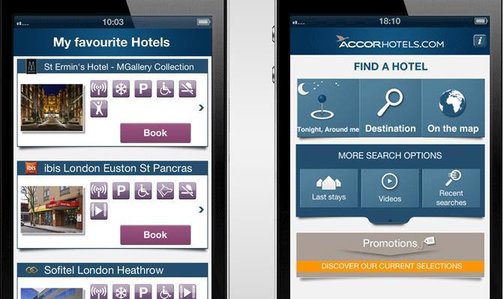Are mobile booking engines really worth the hassle?
The more user friendly and ‘hassle’-free a company’s mobile booking service is, the more time and measurable ‘hassle’ they’ve gone through to make it that way. So the big question is this: is making the mobile reservation as smooth as possible worth the effort? EyeforTravel’s Ritesh Gupta finds out.
The modern traveller on the go expects a mobile booking service to deliver a turmoil-free experience while they search for, check availability and complete a booking. With mobile traffic on the rise, hotel companies run the risk of losing bookings if they don’t improve their mobile conversion rate - and mobile bookings are on the rise. Since 2011, 63% more travel suppliers saw mobile booking volumes increase, according to the EyeforTravel.com Social Media and Mobile in Travel Distribution Report 2013.
So yes the hassle is worth it but there are steps hotels companies should be taking to make the most of this fast growing channel. By learning how to convert and format content to work on any mobile device and finalise an appropriate real-time booking engine interface for users on the go, for example, the risk of attrition in the booking process becomes less of a problem. There are several crucial aspects that should come together for customers when choosing mobile booking engines.
A mobile booking engine should:
· Feature a user-friendly interface that works with all platforms, and also identify the device automatically and present the apt custom interface.
· Allow users to search, view availability and book a room seamlessly. Users should also be able to offer content, pictures and rates the way it is done for websites.
· Allow hotels to manage inventory easily for mobile-related bookings to pave way for promotional pricing, room upgrades etc.
· Allow hotels to track progress by, for example, tracking search terms or pay-per-click to shape full management reports.
Despite tremendous improvement in technology, there is scope for garnering more revenue.
“The percentage of traffic (via mobile) has become substantial, but the revenue contribution seems to be more modest than the traffic curve all round,” Riko van Santen, vice president digital strategy and distribution, Kempinski Hotels shared in an interview recently. At industry level, he has seen that it also varies by market segment (1-star to 5-star). “What sometimes skews the statistics are the tablets. Brands compare often by device, while 3rd party channels may provide statistics by ‘mobile’ where some include tablets, and some don’t. That's a big difference,” he argues.
Mobile is becoming a full-fledged booking channel
Hotel companies across various markets are interestingly experiencing different patterns for what is being booked via mobile. Booking windows, the length of stay and the value of booking – all vary for different entities.
“Mobile is a young but full booking channel - legally speaking a mobile booking is submitted to the same conditions as a booking made on a computer. Mobile is an extension of desktop booking which generates incremental business – in the last minute in particular,” says Mathieu Saccharin, e-commerce mobile director at Accor. “In addition, as mobile devices are always available, it has a great potential in terms of value added services and offers.”
So dedicated allocation to mobile, in particular for last minute deals will no doubt be studied carefully: desktop and mobile devices all serve hotels inventory and revenue management rules.”

Managing the show
With mobile booking engines now much more mobile agnostic it is now much easier to serve up content across multiple channels. The process today is much easier and more seamless, says Alan Love, corporate director of property sales and marketing, Rosewood Hotels and Resorts.
From Accor’s perspective, Saccharin has this to say: “Our mobile booking engine is a ‘mirror’ of our desktop booking engine as far as core features are concerned. Some advanced features such as packages or ancillary services are not yet distributed on mobile.”
The Accor mobile website has been developed with specific focus on creating synergy and additional value to existing desktop marketing activity. Thus, Accorhotels event promotions such as ‘private sales’ or ‘super sales’ are distributed on both desktop and mobile platforms, using the same internal process and resources.”
Referring to content-related aspects, Saccharin shared the following insights:
· When delivering hotel content correctly formatted to any mobile device the entity uses a rendering platform which is directly plugged on to its hotel directory platform. Hotel content is thus fully adapted to mobile. Web content is used for tablets.
· External content such as (weather, or information of activities around the hotel, etc.) still requires additional developments.
Real challenges ahead
Saccharin ran through some of the challenges that need to be addressed:
· Mobile payment: 3D Secure and other new forms of web payment/security control are launched by banks with little or no consideration for mobile usage. “The experience takes longer and is very poor in terms of interface. This has to be improved in the very short term for the sake of m-commerce success,” says Saccharin.
· Analytics: Accor uses same tracking tools and processes for mobile and desktop web: Xiti, Kenshoo, etc. Saccharin acknowledges how mobile analytics has improved to reach a high level of detail and accuracy but identifies that there is still a need to track cross channel usage to optimise customer knowledge and display personalised offers at the right time on the right device.
Rosewood Hotels and Resorts’ Love claims the firm has fairly extensive reporting and tracking on mobile bookings through its web analytics programme. However, improving on measurement or making most of the data further depends on performance. On whether the organisation is using real-time profiling to gear up to serve guests better, Love says such plans can’t take off “until we see further growth in bookings through mobile devices”.

